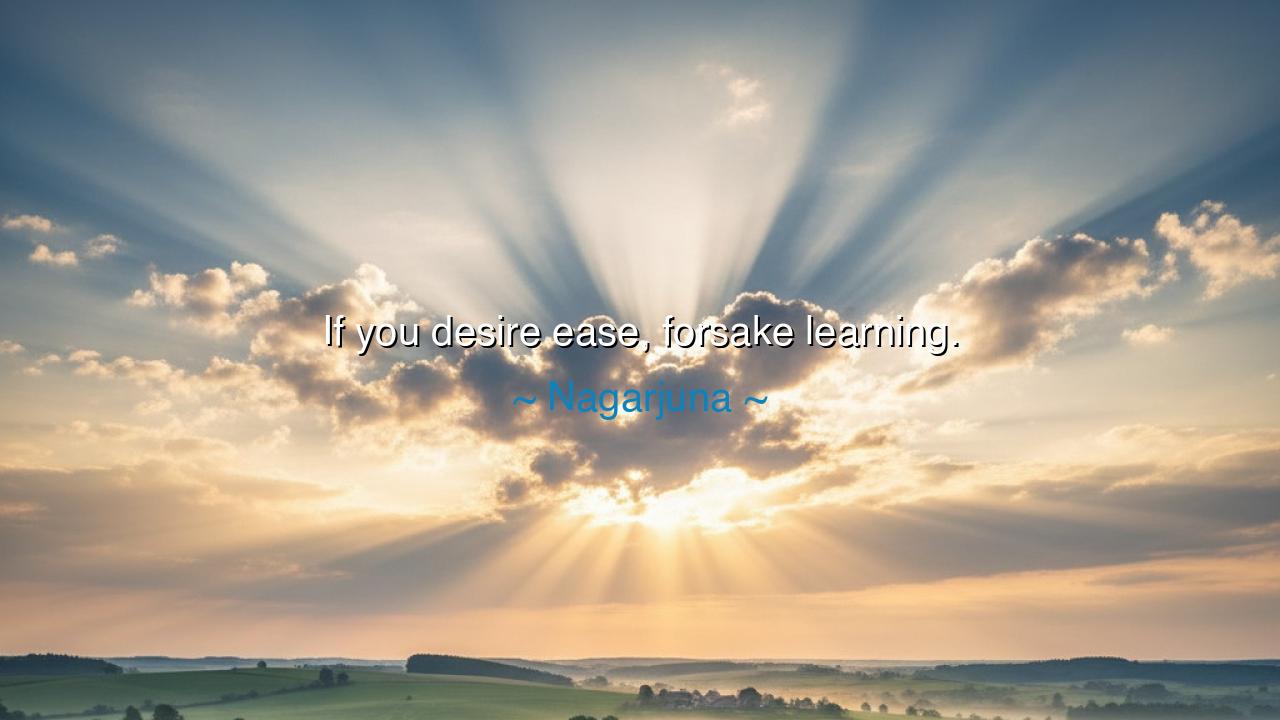
If you desire ease, forsake learning.






“If you desire ease, forsake learning.” — thus spoke Nagarjuna, the great Buddhist philosopher of ancient India, whose words pierce through comfort like a blade of truth. In this saying lies a teaching both stern and luminous: that the path to wisdom is not the path of ease, and that the one who seeks knowledge must abandon the dream of a tranquil, effortless life. For true learning — whether of the mind, the heart, or the soul — demands struggle, patience, and the courage to face one’s own ignorance. To learn is to awaken, and awakening is never restful.
Nagarjuna lived in an age of deep contemplation and spiritual ferment, where seekers of truth wandered forests and deserts, questioning all things, even the nature of existence itself. In his works, he shattered illusions — not with comfort, but with clarity. So when he said, “If you desire ease, forsake learning,” he was not condemning peace; he was warning that peace cannot be built upon idleness. Learning is a sacred fire, and whoever approaches it must be ready to burn away complacency, pride, and the comfort of certainty. The lazy soul may sleep soundly, but it will never awaken to truth.
To learn, in the deepest sense, is to confront the limits of the self. It is to discover how little one truly knows. Every step into understanding strips away illusion and falsehood, and this stripping is painful, as a serpent shedding its skin. Many turn away because it is easier to remain unchallenged, to bask in half-truths, to dwell in comfort’s shadow. But the seeker who endures the difficulty of unlearning and relearning walks the path of growth, and in the end, finds freedom greater than ease. For ease is fleeting — a passing breeze — while wisdom endures like the mountain.
Consider the tale of Siddhartha Gautama, who became the Buddha. Born into wealth, he was surrounded by every comfort a mortal could desire. Yet the silk and gold of his palace could not silence the hunger of his spirit. He saw suffering, and he knew that the truths of life could not be found in pleasure or luxury. So he forsook ease — leaving behind family, fortune, and familiarity — to walk the road of asceticism and meditation. Through struggle, hunger, and endless questioning, he pierced the veil of illusion and attained enlightenment. His journey itself is the living embodiment of Nagarjuna’s words: the one who desires comfort will remain asleep; the one who embraces difficulty awakens to eternity.
Likewise, in more recent times, we find echoes of this truth in the life of Nelson Mandela, who spent twenty-seven years in prison, yet emerged wiser, gentler, and stronger in spirit than before. His learning was not from books alone, but from suffering. The iron bars that confined him became, in time, the teachers that forged his character. He did not seek ease, for ease would have meant silence in the face of injustice. Instead, he chose the hard path of principle, and in that path, he learned the meaning of freedom — not comfort, but understanding.
This is the paradox of wisdom: the more we learn, the less at ease we become, for the world grows vast and mysterious before our eyes. Yet within that unease lies the birth of transformation. The mind expands; the heart deepens. As the ancients said, “The sea is roughest where it is deepest.” And so it is with learning — shallow waters are calm, but true depth stirs storms within. Those who seek to know must learn to sail through them, guided by purpose rather than ease.
Therefore, my children, if you seek to learn, prepare yourselves for labor. Do not desire ease, for ease dulls the spirit and silences the hunger that drives growth. Embrace the discomfort of curiosity, the strain of discipline, the humility of correction. When you struggle to understand, rejoice — for you are awakening. When you feel the pain of ignorance, take heart — for wisdom is near. The wise do not seek to make life easy; they seek to make it meaningful.
Let your days, then, be filled with learning and striving, not for the comfort of rest, but for the radiance of truth. Remember always the words of Nagarjuna: ease belongs to those who sleep, but learning belongs to those who dare to awaken. And in the end, though your path may be steep and your trials many, the summit you reach will grant a joy greater than any ease — the joy of becoming fully, gloriously alive.






AAdministratorAdministrator
Welcome, honored guests. Please leave a comment, we will respond soon